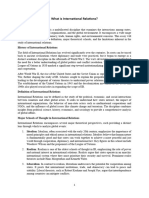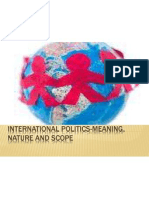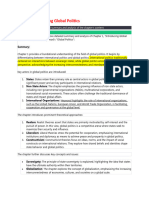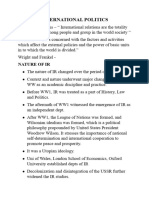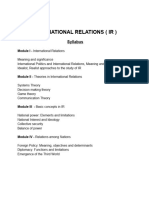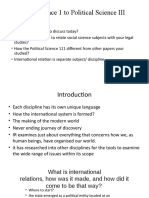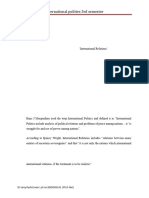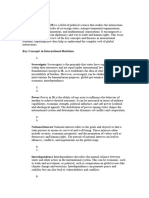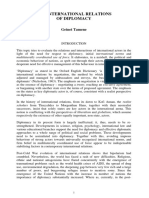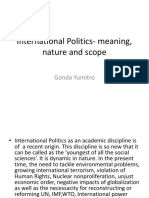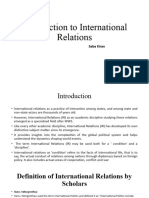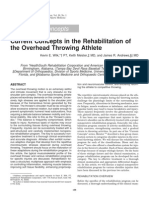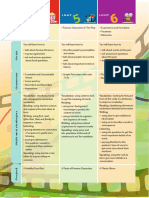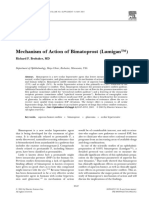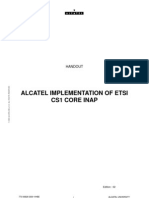Ir - Meaning Nature & Scope
Ir - Meaning Nature & Scope
Uploaded by
Iss AaaCopyright:
Available Formats
Ir - Meaning Nature & Scope
Ir - Meaning Nature & Scope
Uploaded by
Iss AaaOriginal Title
Copyright
Available Formats
Share this document
Did you find this document useful?
Is this content inappropriate?
Copyright:
Available Formats
Ir - Meaning Nature & Scope
Ir - Meaning Nature & Scope
Uploaded by
Iss AaaCopyright:
Available Formats
INTERNATIONAL POLITICS:
Meaning, Changing Nature &
Scope
MEANING
International politics, also known as international relations, is the multidisciplinary
study of interactions, behaviors, and relationships among sovereign states, non-
state actors, and international institutions in the global arena. It seeks to understand
the dynamics of power, diplomacy, cooperation, conflict, and the formation of
policies at the international level. International politics explores how states pursue
their interests, how international norms and institutions shape their actions, and how
emerging challenges like globalization and transnational issues influence the
conduct of nations on the world stage.
Like politics, International Politics is also a struggle for power, just at a bigger
international stage played among nations.
Definitions from Notable Political Scientists:
1. Hans J. Morgenthau: Defined international politics as "the struggle for power
among nations." He emphasized the role of power, national interests, and the
inherent competition in international relations.
2. Kenneth N. Waltz: Defined international politics as the "realm of anarchy." He
argued that the absence of a global government leads to a self-help system where
states must rely on their own capabilities for security, making international politics a
competitive and anarchic arena.
3. Joseph S. Nye Jr.: Defined international politics as "the ability to affect others to
obtain the outcomes one wants through attraction and persuasion rather than
coercion." He emphasized the importance of non-coercive forms of influence in
international relations.
Formation of International Politics as a Distinct Discipline:
INTERNATIONAL POLITICS: Meaning, Changing Nature & Scope 1
International politics as a distinct academic discipline emerged in response to several
conditions and factors:
1. Peace of Westphalia (1648):
The Peace of Westphalia marked the end of the Thirty Years' War and the Eighty
Years' War, and it is often considered a seminal event in the development of
international politics. This treaty system helped establish the principles of state
sovereignty and non-interference in the domestic affairs of other states, laying the
groundwork for the modern state-centric international system.
2. Colonial Expansion and Imperialism:
The expansion of European powers through colonization and imperialism in the 19th
century led to complex international relations, competition for territories, and
conflicts among colonial powers. Scholars began to analyze these interactions and
their implications.
3. Complex Alliances and Entanglements:
The 19th century witnessed a web of complex alliances and entanglements among
European states. These alliances contributed to the tensions that eventually erupted
into World War I, highlighting the need for a more systematic understanding of
international relations.
4. World Wars and Global Conflict:
The devastation of World War I and World War II underscored the importance of
studying international relations to prevent such catastrophic conflicts in the future.
The establishment of international organizations like the League of Nations and the
United Nations was a response to the need for global governance and conflict
resolution.
5. Intellectual Contributions:
Thinkers and scholars, such as Thucydides, Niccolò Machiavelli, and later figures
like E.H. Carr and Hans Morgenthau, made significant contributions to the
development of international relations theory. Their writings laid the groundwork for
the systematic study of international politics.
INTERNATIONAL POLITICS: Meaning, Changing Nature & Scope 2
Historical Evolution of International Politics:
The study of international politics has a rich history, which can be divided into several
key phases:
This historical evolution highlights the continuous transformation of international politics
as it adapts to the changing global landscape. It has evolved from classical power
politics to a more complex, interdependent, and interconnected field that encompasses
various actors and issues beyond traditional state-centric concerns.
CHANGING NATURE
International politics is a field that is inherently difficult to define due to its dynamic and
ever-evolving nature. Its constant state of flux makes it a moving target for scholars and
practitioners.
Two Main Viewpoints Regarding it’s Nature:
1. Traditional and Limited Viewpoint:
The traditional and limited viewpoint of international politics tends to emphasize
state-centric power dynamics.
It focuses on the role of nation-states as the primary actors and centers on issues of
national security, diplomacy, and traditional military power.
This perspective often downplays the influence of non-state actors, global
interconnectivity, and transnational challenges.
2. Contemporary and Extensive Viewpoint:
The contemporary and extensive viewpoint of international politics recognizes the
evolving nature of the field.
INTERNATIONAL POLITICS: Meaning, Changing Nature & Scope 3
It acknowledges the impact of globalization, technological advancements, non-state
actors, and complex global challenges.
This perspective emphasizes a broader array of factors, including economic power,
soft power, information warfare, environmental issues, and the interconnectedness
of nations in shaping the international landscape. It embraces a more inclusive and
dynamic understanding of international relations.
Features Of The Nature Of International
Politics:
The main features of the nature of International Politics are:
1. NATIONS ARE THE PRIMARY ACTORS
2. NATIONAL INTEREST IS THE MAIN GOAL
3. CONFLICT IS THE REALITY OF INTERNATIONAL POLITICS
4. POWER IS BOTH MEANS AND AN END
5. CONFLICT RESOLUTION AND COOPERATION & COMPETETION ARE AN
INTEGRAL PART
6. A SYSTEM OF CONSTANT INTERACTIONS AND ACCOMODATION
7. ANARCHIAL SYSTEM
8. INTER-DISPILINARY IN NATURE
9. GLOBAL IN CHARACTER
10. INCLUDES A STRUCTURE OF POWER HIERARCHY
Scope Of International Politics:
The scope of International Politics has undergone a drastic change over time. The
shape of International Politics today is like a butterfly effect/ripple effect set in motion by
some small and some significant canonical events that took place among nations.
Following aspects should be taken under the study of scope and subject matter of IP:
INTERNATIONAL POLITICS: Meaning, Changing Nature & Scope 4
1. NATION-STATE SYSTEM
2. POWER
3. NATIONAL INTEREST
4. INTERNATIONAL LAW
5. INTERNATIONAL MORALITY
6. INTERNATIONAL ORGANIZATIONS
7. STUDY OF REGIONAL ORGANIZATIONS AND ALLIANCES
8. GLOBAL POWER STRUCTURE
9. FOREIGN POLICY
10. STUDY OF DIFFERENT IDEALOGIES
11. CONFILCT & CONFLICT RESOLUTION
12. ARMS CONTROL AND DISARMAMENT
13. IMPERIALISM/ COLONIALISM AND NEO-COLONIALISM
14. NATIONALISM
15. NATIONAL CHARACTER &NATIONAL MORALE
16. ECONOMIC ELEMENTS
17. STUDY OF DIPLOMACY
18. STUDY OF NON-STATE ACTORS
19. STUDY OF VARIOUS CONCEPTS
20. STUDY OF GLOBAL ISSUES AND CONCERNS
INTERNATIONAL POLITICS: Meaning, Changing Nature & Scope 5
You might also like
- International PoliticsDocument11 pagesInternational PoliticsBalrajSinghBatthNo ratings yet
- Assignment of International RelationsDocument7 pagesAssignment of International RelationsAlina MinhasNo ratings yet
- Subject: Political Science Iii Course: Ba LLB Semester Iii Lecturer: Ms. Deepika Gahatraj Module: Module I, Origin of International Relation As A Discipline Nature and Scope Approaches To StudyDocument4 pagesSubject: Political Science Iii Course: Ba LLB Semester Iii Lecturer: Ms. Deepika Gahatraj Module: Module I, Origin of International Relation As A Discipline Nature and Scope Approaches To StudyÁř RehmanNo ratings yet
- Diplomacy 1Document6 pagesDiplomacy 1api-3757108100% (1)
- Antonis M.Koltsidas - Greek Education in Monastir - PelagoniaDocument256 pagesAntonis M.Koltsidas - Greek Education in Monastir - Pelagoniavaler_crushuveanlu67% (3)
- CA 2mark and 16 Mark With AnswerDocument112 pagesCA 2mark and 16 Mark With AnswerOmprakash DNo ratings yet
- English For Academic and Professional Purposes: Quarter 1 - Module 3 Approaches in Literary CriticismDocument42 pagesEnglish For Academic and Professional Purposes: Quarter 1 - Module 3 Approaches in Literary CriticismMyst90% (49)
- Pol Sci Unit I-VDocument85 pagesPol Sci Unit I-VLakshayNo ratings yet
- What is International Relations_241225_164432Document3 pagesWhat is International Relations_241225_164432nassir.zafzafi33No ratings yet
- Global Affairs 1Document40 pagesGlobal Affairs 1tamru4239No ratings yet
- Global Shert 1-4uniteDocument21 pagesGlobal Shert 1-4uniteYawkal AddisNo ratings yet
- 1.1. Conceptualizing Nationalism, Nations and States: Chapter One Understanding International RelationsDocument21 pages1.1. Conceptualizing Nationalism, Nations and States: Chapter One Understanding International RelationsWiz SantaNo ratings yet
- International Politics-Meaning, Nature and ScopeDocument11 pagesInternational Politics-Meaning, Nature and Scopevivekskp14100% (3)
- 939352410international Politics G K Jha 280420Document7 pages939352410international Politics G K Jha 280420Arya VermaNo ratings yet
- What Is Foreign Policy? Definition and Examples: Ranke Diplomacy International TradeDocument4 pagesWhat Is Foreign Policy? Definition and Examples: Ranke Diplomacy International TradeRichard Tampog GaleraNo ratings yet
- Political ScienceDocument7 pagesPolitical ScienceMary-ann NabiaNo ratings yet
- Week-1 Summary Introducing Global Politics (ChatGPT)Document7 pagesWeek-1 Summary Introducing Global Politics (ChatGPT)nikovasmoyskiNo ratings yet
- GE Study Material-Understanding IR GE Study Material - Understanding IRDocument46 pagesGE Study Material-Understanding IR GE Study Material - Understanding IRMeenal Sisodiya100% (1)
- IR Assignment CompilationDocument71 pagesIR Assignment Compilationअभि विश्वकर्माNo ratings yet
- MPS 002Document15 pagesMPS 002gautampursecondaryschool2012No ratings yet
- Scope of International RelationsDocument4 pagesScope of International RelationsAimen RaoNo ratings yet
- I R Powerpoint NoteDocument13 pagesI R Powerpoint Notetabu69756No ratings yet
- International Relations Is An Academic Discipline That Focuses On The Study of The Interaction ofDocument3 pagesInternational Relations Is An Academic Discipline That Focuses On The Study of The Interaction ofabiola soliuNo ratings yet
- International Studies Final Exam - ManghiDocument6 pagesInternational Studies Final Exam - ManghiBielan Fabian GrayNo ratings yet
- What Is International Relation?Document5 pagesWhat Is International Relation?Shriyashi KhatriNo ratings yet
- Unit One IR BaharadinDocument11 pagesUnit One IR Baharadinobsa abdallaNo ratings yet
- GT Chapter 1Document8 pagesGT Chapter 1sisaydagmawi0442No ratings yet
- International Politics Sem 2Document5 pagesInternational Politics Sem 2niranjaneratNo ratings yet
- INTRODUCTION TO INTERNATIONAL RELATIONS ENGLISH (3)Document29 pagesINTRODUCTION TO INTERNATIONAL RELATIONS ENGLISH (3)Khadija HameedNo ratings yet
- Internation RelationDocument149 pagesInternation Relationsmileyyyyyy053No ratings yet
- Reading Report Theories of GPDocument4 pagesReading Report Theories of GPLuis Fernando MartinNo ratings yet
- Nature of International RelationsDocument4 pagesNature of International RelationsAimen RaoNo ratings yet
- IR - LiberalismDocument23 pagesIR - LiberalismanshulNo ratings yet
- Global Trend Handout2021Document77 pagesGlobal Trend Handout2021dgetachew513No ratings yet
- Politics FinalDocument36 pagesPolitics Finalchummaoruresam2kNo ratings yet
- Global Affairs-1Document269 pagesGlobal Affairs-1shumetwerku676No ratings yet
- Study of International Politics (Areas and Scope)Document2 pagesStudy of International Politics (Areas and Scope)Rupesh NewtonNo ratings yet
- Ir ApproachesDocument15 pagesIr ApproachesmohsinbilalNo ratings yet
- Political Science 1 To Political Science IIIDocument33 pagesPolitical Science 1 To Political Science IIIToxic XitNo ratings yet
- Ge Study Material Understanding IrDocument46 pagesGe Study Material Understanding IrShruti KumariNo ratings yet
- Development of Ir and Realism - 2Document15 pagesDevelopment of Ir and Realism - 2Fahad RaoNo ratings yet
- Indian Hostile Narratives and Counter Narratives of PakistanDocument13 pagesIndian Hostile Narratives and Counter Narratives of PakistanJournals ConsultancyNo ratings yet
- Notes for Third SmisterDocument73 pagesNotes for Third Smistershabirgani12No ratings yet
- Resuemn International RelationsDocument4 pagesResuemn International Relationsoliviahye1819No ratings yet
- International Politics Meaning Nature and ScopeDocument12 pagesInternational Politics Meaning Nature and ScopeKiran KumarNo ratings yet
- Global NotesDocument35 pagesGlobal NotesI can do itNo ratings yet
- Global Trend Chapter 5Document66 pagesGlobal Trend Chapter 5Tolera Tadesse100% (1)
- Cabagbag, Janmarinie ACTIVITY&MODULE2.CONTEMPORARY WORLD - CH 3-5Document14 pagesCabagbag, Janmarinie ACTIVITY&MODULE2.CONTEMPORARY WORLD - CH 3-5Marinie CabagbagNo ratings yet
- Political Science II - International Relations - Theories and Concepts Notes (Ultimate Version) PDFDocument70 pagesPolitical Science II - International Relations - Theories and Concepts Notes (Ultimate Version) PDFFredrich alonzo100% (2)
- International Relations PptsDocument32 pagesInternational Relations PptsSyeda zoya AhsanNo ratings yet
- Actors Arnold WolfersDocument16 pagesActors Arnold Wolferssashikumar1984No ratings yet
- International RelationDocument3 pagesInternational Relationtejukaki0No ratings yet
- Mulungushi University School of Social SciencesDocument5 pagesMulungushi University School of Social ScienceskingNo ratings yet
- Diplomacy in IRDocument36 pagesDiplomacy in IRmanahil dollNo ratings yet
- Ir Meaning Nature and Scope NotesDocument12 pagesIr Meaning Nature and Scope Notesananthugn1234No ratings yet
- CC-8 International RelationsDocument8 pagesCC-8 International RelationsDon BadsaNo ratings yet
- International Politics Meaning Nature and ScopeDocument12 pagesInternational Politics Meaning Nature and ScopeMohammed Arif KhanNo ratings yet
- Global SlideDocument90 pagesGlobal SlidewabdushukurNo ratings yet
- IR and IPDocument9 pagesIR and IPMasud ParvezNo ratings yet
- DR - Omotosho AssignmentDocument8 pagesDR - Omotosho Assignmentabiola soliuNo ratings yet
- Week 1 Intro To IRDocument16 pagesWeek 1 Intro To IRMalik Muqarrab QadeerNo ratings yet
- IR NotesDocument16 pagesIR Notespiyushkumarji1842No ratings yet
- Standard Costing & Variance AnalysisDocument10 pagesStandard Costing & Variance AnalysisMariella Antonio-NarsicoNo ratings yet
- APAO2024 Abstract-Book v6Document764 pagesAPAO2024 Abstract-Book v6okta.xiiipa3No ratings yet
- Open Cloze 1 Extra Practice ExercisesDocument2 pagesOpen Cloze 1 Extra Practice ExercisesdanielahuertaNo ratings yet
- TCS Centres - Zero LifestyleDocument10 pagesTCS Centres - Zero LifestyleImran Aziz MotiwalaNo ratings yet
- Physics 1120: Work & Energy Solutions: NC Grav F Spring I 2Document27 pagesPhysics 1120: Work & Energy Solutions: NC Grav F Spring I 2Sundly Talorong ElerioNo ratings yet
- Chapter 5Document3 pagesChapter 5Anass AbajtourNo ratings yet
- Completing The SquaresDocument36 pagesCompleting The SquaresJODALYN ODICTANo ratings yet
- Michael Bloom Resume 3 2018docx 3Document3 pagesMichael Bloom Resume 3 2018docx 3api-367519610No ratings yet
- Jurisprudence On Cedula and Personal Appearance Notary PublicDocument13 pagesJurisprudence On Cedula and Personal Appearance Notary Publicdorothy annNo ratings yet
- Sidebotham 2013Document9 pagesSidebotham 2013Kiara DattaNo ratings yet
- Throwing RehabDocument16 pagesThrowing RehabSean GlynnNo ratings yet
- The Logic of Sexuation in John DonneDocument2 pagesThe Logic of Sexuation in John Donneignoramus83No ratings yet
- 102-The One With The Sonogram at The EndDocument11 pages102-The One With The Sonogram at The EndEsther TheodoraNo ratings yet
- A Matrix On Developing A Lesson in Reading: En4V-Iiif-38Document5 pagesA Matrix On Developing A Lesson in Reading: En4V-Iiif-38Sheryl GloriosoNo ratings yet
- Lab 1Document14 pagesLab 1HudaNo ratings yet
- 9no Egb A1.2 Ingles Student Book (1) 5Document1 page9no Egb A1.2 Ingles Student Book (1) 5July CNo ratings yet
- Art Vi CasesDocument134 pagesArt Vi CasesAriane EspinaNo ratings yet
- (Essentials in Ophthalmology) Gyan Prakash, Takeshi Iwata - Advances in Vision Research, Volume II - Genetic Eye Research in Asia and The Pacific (2019, Springer Singapore) PDFDocument464 pages(Essentials in Ophthalmology) Gyan Prakash, Takeshi Iwata - Advances in Vision Research, Volume II - Genetic Eye Research in Asia and The Pacific (2019, Springer Singapore) PDFtegarbondanNo ratings yet
- Bijoy Bio-DataDocument4 pagesBijoy Bio-Dataovik sahaNo ratings yet
- Information Gathering: Interactive Methods: Systems Analysis and Design, 8e Kendall & KendallDocument52 pagesInformation Gathering: Interactive Methods: Systems Analysis and Design, 8e Kendall & KendallAnonymous j211AVRNo ratings yet
- Brubaker 2001Document5 pagesBrubaker 2001Residencia OftalmologíaNo ratings yet
- Cs1 Core Inap NewDocument81 pagesCs1 Core Inap NewNitin SinglaNo ratings yet
- Enlg Speech Writing 1Document16 pagesEnlg Speech Writing 1aishazariya02No ratings yet
- Mark Scheme (Results) Summer 2013: GCSE Biology (5BI3H) Paper 01Document17 pagesMark Scheme (Results) Summer 2013: GCSE Biology (5BI3H) Paper 01ChemistixNo ratings yet
- Listening and Speaking (Oral Communication)Document43 pagesListening and Speaking (Oral Communication)mashala38No ratings yet
- Maryam Diana - Assignment Meet 7 - CCUDocument2 pagesMaryam Diana - Assignment Meet 7 - CCUmaryamNo ratings yet
- Practicing Wesleyan-Holiness Spiritual Formation Instructors GuideDocument328 pagesPracticing Wesleyan-Holiness Spiritual Formation Instructors GuideApril Showers100% (1)








